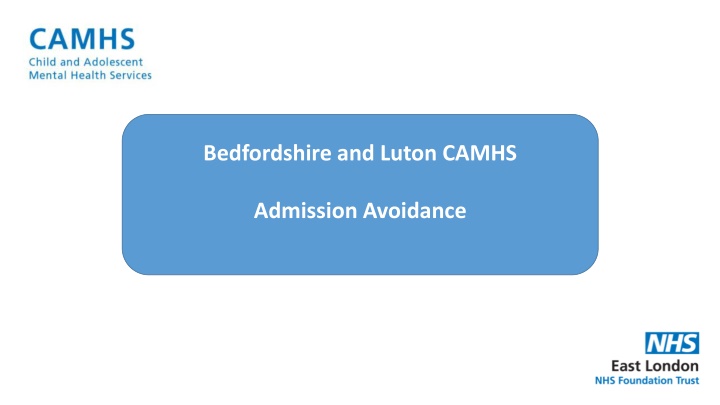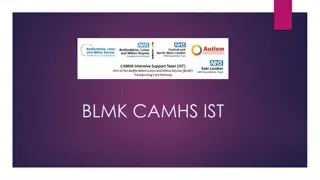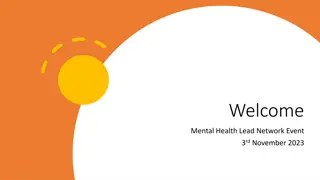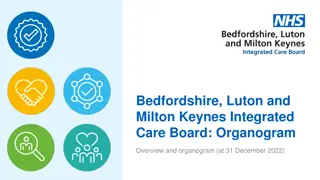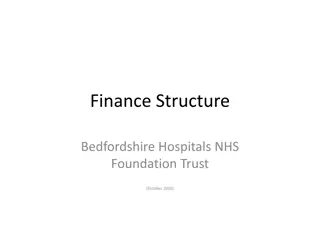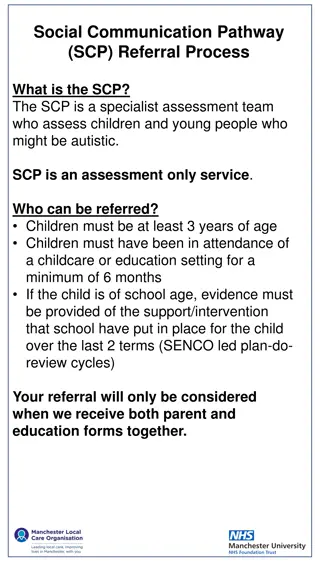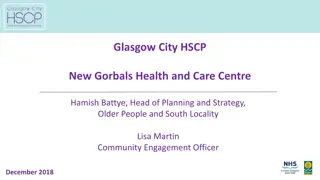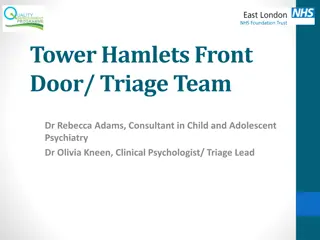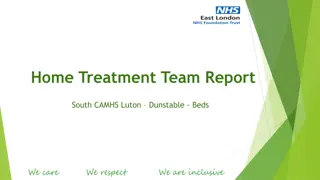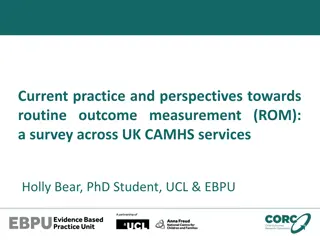Innovative CAMHS Programs in Bedfordshire and Luton
Utilizing a system partnership approach, Bedfordshire and Luton CAMHS focus on admission avoidance and improving urgent cases flow by establishing strong relationships with local acute wards, providing rapid assessment responses, and implementing creative community packages of care. Specific programs like the Eating Disorders Intensive Home Treatment Team and Crisis Home Treatment Teams aim to support young people and families in managing mental health issues effectively to prevent unnecessary hospital admissions. These services offer a holistic approach with intensive meal support, positive behavioral interventions, and tailored care plans to facilitate safe discharges and reduce reliance on Tier 4 inpatient units.
Download Presentation

Please find below an Image/Link to download the presentation.
The content on the website is provided AS IS for your information and personal use only. It may not be sold, licensed, or shared on other websites without obtaining consent from the author.If you encounter any issues during the download, it is possible that the publisher has removed the file from their server.
You are allowed to download the files provided on this website for personal or commercial use, subject to the condition that they are used lawfully. All files are the property of their respective owners.
The content on the website is provided AS IS for your information and personal use only. It may not be sold, licensed, or shared on other websites without obtaining consent from the author.
E N D
Presentation Transcript
Bedfordshire and Luton CAMHS Admission Avoidance
System Partnership to improving urgent cases flow: System Partnership to improving urgent cases flow: Daily huddles with local CAMHS teams and local acute wards strong relationships CAMHS Practitioners embedded on wards Emphasis on admission avoidance / creative community packages of care where clinically appropriate / safe. Positive risk taking Rapid same day response for assessment by CAMHS crisis staff Diversion from A&E depts. for urgent cases ie: GP / school / Home Twice weekly crisis huddles with system partners (inc. LA / EoE Collaborative and acute leads) Clinical oversight of urgent cases within the system Partnership approach with LA s clear escalation process in place Development / need for local social care placement provisions ie: LBC Strong links with adult colleagues
BLMK Eating Disorders Intensive Home Treatment Team To provide therapeutic support to young people and their families, in their homes to enable them to manage the illness to stay out of hospital or return home earlier than would otherwise be possible. Referral criteria: Young people who are under the age of 18 and being treated by CEDS been medically stabilised on the acute wards and now ready for discharge back into the community with support. Who are at risk of needing a specialist inpatient admission (Tier 4). Facilitate safe discharge from Tier 4 units Staffing Intensive support for meals, snacks and post meal distraction: On the ward In clinic or in home Face to face or remote Positive meal support modelled to parents Empowering parents to make appropriate decisions Positive behavioural support Engagement with FT-AN Basic CBT Tier 4: liaison, home leave support, discharge planning 1x Lead Nurse (seconded from CEDS) 3 x Nurses (2 in post, 1 vacancy) 6 x Support Workers (4 in post, 2 going through recruitment) 8am-8pm M-F + weekend calls at present, when fully staffed will be 8am- 8pm 7 days a week Bespoke care plan for each family: - CEDS clinicians continue input - HITT support reviewed every 2 weeks (for up to 6 weeks). This model supports the FT-AN (Family Therapy for Anorexia Nervosa) approach which is a NICE concordant treatment for eating disorders.
North and South Bedfordshire Crisis Home Treatment Teams To provide therapeutic support to young people and their families, in their homes to enable them to manage the illness to stay out of hospital or return home earlier than would otherwise be possible. Provision Reduce the number of young people with mental health needs being admitted on to local acute hospital paediatric or adult wards where there is no indication for medical treatment. Aims of the service The service will operate between 9am and 9pm Monday to Friday and 10am to 8pm weekends and bank holidays. Provide an alternative and reduce admissions to Tier 4 CAMHS provision (mental health inpatient units). Reduce the length of stay for young people that are in Tier 4 CAMHS Staffing Professional Lead Psychiatry Mental Health Nurses/Social Workers Support Workers Senior Social Worker Psychologist Systemic Practitioner Administrator Intensive Home Treatment Support as an alternative to inpatient admission: Up to 3 direct appointments a day which may include a blended approach of face to face, telephone, virtual or text support. Home Treatment support offered for up to a maximum of 8 weeks Young people will be discussed on daily basis in crisis huddle and offered a review from psychiatrist on weekly basis. Aim of intervention is to stabilise Crisis, improve understanding of current crisis, restore coping for young person and family and reduce the assessed associated risks of harm to self or others, provide short term treatment for presenting mental health needs. Recruitment is underway across BLMK and the teams are starting to develop with new starters working closely with the current crisis teams.
BLMK Intensive Support Team Staffing Professional Lead Mental Health Nurses Social Workers Support Workers Intensive Support Team will be working across Bedford, Luton and Milton Keynes providing support for with children and young people (CYP) with Learning Disabilities (LD) and Autism Spectrum Disorder (ASD) at risk of admission to more complex inpatient treatment (Tier 4) provision and/or becoming a Looked After Child. Recruitment is underway across BLMK and the team has started to take young people onto their caseload. The Professional Lead will work across BLMK and will have responsibility for each of the four clusters aligned to the local authorities. IST model will require a Spend to Save approach. Spend to Save is based on the principle that investing in appropriate interventions and packages of care will significantly result in contributing and maintaining a robust and holistic infrastructure to support C&YP and will help to avoid and avert C&YP further falling into crisis. The service will operate Monday to Friday 9am to 5pm.
Dialectical Behaviour Therapy (DBT) Groups DBT is a type of talking therapy that helps young people who may self-harm, have difficulty regulating their emotions effectively and struggle to tolerate distress. It is a structured treatment plan that involves you attending individual weekly therapy & weekly group skills training. This pathway will be closely aligned with our Crisis Home Treatment Teams. North and South Bedfordshire Both services are coming to the end of groups that have run in 2021 and 2022 for different lengths of time. Working is being done to develop a rolling programme of DBT groups for young people and parents, offering weekly DBT skills group, weekly 1to1 sessions and telephone support. Milton Keynes Service has been up and running for a number of years. Offer 9 month DBT programme including Weekly DBT skills group Weekly 1to1 DBT sessions Telephone support from DBT clinicians Aim to have two separate teams across North and South Beds CAMHS, with a standalone cohort of staff who have time built into their job plans to undertake DBT work.
Mind BLMK CAMHS Support for Acute Paediatric Wards To provide therapeutic support to young people and their families, in their homes to enable them to manage the illness to stay out of hospital or return home earlier than would otherwise be possible. and distress in a safe and appropriate environment, in order to reduce activity in Emergency Departments and the wider system including mental health services, police and ambulance services. Young Person s Sanctuary Aims of the service Aims of the service The Bedfordshire and Luton mental health crisis provision will support people in crisis to better self-manage their symptoms The aim is to improve the experience and outcome of the young people within the wards and ease pressure on the staffing needs. Having continuity of care will increase patient experience and reduce the reliance on agency and bank staffing. It will also help increase staff awareness of emotional health needs and increase staff confidence when managing such cases. The support will consist of: identifying coping strategies and improving wellbeing information and signposting 1-1 conversations, group/ peer conversations Referral for a mental health assessment when appropriate To supplement the current staffing resources for Bedfordshire Hospital s paediatric departments at both in Luton & Dunstable Hospital and Bedford General Hospital. The additional resource will enable Bedfordshire Hospitals to recruit fixed term staff to support existing skill mix within the wards with a focus on improving care to young people presenting with emotional health needs. The services will open from 1600 - 2200, open Monday-Friday. In accessible venue across Bedford, Central Bedfordshire and Luton.
